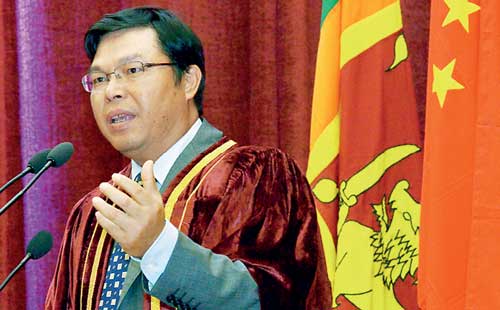Sunday Mar 01, 2026
Sunday Mar 01, 2026
Thursday, 16 February 2017 00:46 - - {{hitsCtrl.values.hits}}
By Chathuri Dissnayake
Sending a strong message to all Sri Lankan political actors, Chinese Ambassador to Sri Lanka, Yi Xianliang, yesterday sought to put fears of Chinese occupation to rest, assuring that his country would not interfere in Sri Lanka’s internal political matters but insisted the future of the  Hambantota Port and Sri Lanka’s role in the One Belt One Road (OBOR) initiative would be determined by what the people decided.
Hambantota Port and Sri Lanka’s role in the One Belt One Road (OBOR) initiative would be determined by what the people decided.
Insisting that China would respect the laws of the country and accept the decisions of the Government on the matter, Xianliang indicated that the Chinese partner was flexible to negotiate the percentage of ownership share of the Hambantota Port Public-Private Partnership deal on the condition that the investors retained control.
“We will fully respect the Government’s decision and the consensus of the Sri Lankan people. We have no intention to intervene in the internal differences between politicians, political groups or leaders - current, future or past leaders,” he said while delivering the 13th Sujatha Jayawardena Memorial Oration organised by Colombo University Alumni Association.
Referring to the Fundamental Rights application filed by Joint Opposition Parliamentarian Vasudeva Nanayakkara against the leasing of the Hambantota Port and a land area, Xianliang said that his Government would always respect the law of the country and the decisions of the Government on the matter. However, he warned that slow progress may cost the country much-needed foreign investments from Chinese businesses.
Speaking to journalists on the sidelines of the event, Xianliang stressed that the Chinese Government was “flexible on the percentage of share ownership in the Hambantota Port but insisted that the controlling percentage of the venture should lie with the Chinese company. The negotiations between the two parties are still ongoing following the signing of the Framework Agreement (FA) between the Sri Lankan Government and the Chinese investor, State-owned corporate China Merchants Port Holdings Company Ltd. (CMPort) to revive the Hambantota Port.
The Ambassador also indicated that the Chinese investors were not interested in the Hambantota Port as a standalone venture. Stressing the importance of the port in the navigation of international shipping lines and in the OBOR initiative, Xianliang said that it should be developed through establishing industrial zones connected to the port
“If we have just a port it is not enough to support the operation of the port so that’s why I made the suggestion to both presidents, the Chinese President and Sri Lankan President, and the two governments that we should have an industrial zone. This is the experience not only China but with all other South Asian countries, even in Singapore, Ireland, the US and Japan. Most countries develop fast thorough special zones. This is also to protect your land, to protect our environment. Otherwise you will have industries everywhere,” Xianliang said.
He also highlighted the lack of long-term planning and impact assessment for the Hambantota development zones stressing the need for the Sri Lankan Government to draw up master plans.
However, Xianliang assured that the Chinese Government would only establish industrial zones on land owned by the Board of Investment (BOI) and the Hambantota Port during the first stage.
“Last afternoon I addressed more than 2,000 locals in Hambantota, where we had a cultural performance at the international cultural centre. I promised them we would not take land without permission from the families,” the Ambassador said, stressing that the ownership of the Hambantota Port would remain with Sri Lanka with the Chinese investors only managing the asset.
However, Xianliang highlighted that delays in negotiations and allocating land for industrial zones, coupled with demonstrations against establishing industrial zones, may deter investors from coming to Sri Lanka, despite a Chinese Government policy to “be patient”.
“I remember the instructions of my President to have patience. I have time, I have patience, but you know I’m worried about the patience of the business people. I already persuaded more than 10 Chinese CEOs to invest $ 3 billion to $ 5 billion in the next two or three years. But what happens in the case of the Supreme Court? They are fighting each other, between the police and the protest people so how can I persuade those CEOs?” Xianliang questioned, highlighting the urgency of the matter.